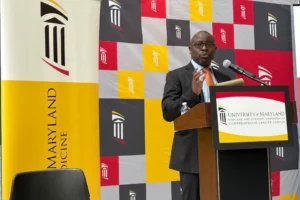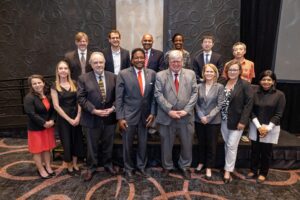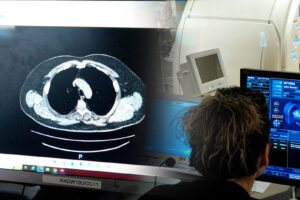UM Carey intellectual property clinic expanding services for entrepreneurs
Published 12/12/17 in the Daily Record
In an effort to increase its presence in Baltimore and offer more legal services to startups, the intellectual property clinic at the University of Maryland Francis King Carey School of Law is going to provide business law services and is opening a location at the new Graduate Research Innovation District at the University of Maryland BioPark.
The clinic has been helping entrepreneurs draft patent applications, file trademark applications and copyright registrations since 2002. Starting in January, the Intellectual Property and Entrepreneurship Clinic (IPEC) will also help businesses form their companies and draft shareholder and stock option agreements, among other business law services.
“We’re expanding the scope of services for our clients,” said Patricia E. Campbell, director of the intellectual property program at UM Carey. Campbell also teaches the intellectual property clinic.
The clinic is currently based out of the Technology Advancement Program at the A. James Clark School of Engineering at the University of Maryland, College Park. The expanded business law services will also be offered on that campus.
While the clinic has relationships with Baltimore-area incubators, including City Garage and the Foundry, it’s difficult for startups to come down to College Park for a meeting to get their legal questions answered, Campbell said.
Other clinic clients include people who hear about the program through the U.S. Patent and Trademark Office, as well as faculty members, graduate and undergraduate students from the University of Maryland who start a company, Campbell said.
Having a location in Baltimore on the UMB campus will improve access for those clients.
“This gives us a much stronger connection with the professional schools at UMB,” she said.
The clinic, which will have 12 law students in the spring, offers free legal services to entrepreneurs who need a few legal questions answered to those who need more sophisticated services spanning an entire semester or multiple years of representation, Campbell said.
The UM Carey clinic hopes to have two staff attorneys for January’s grand opening to prove their expertise.
In the early stages of forming a business, budgets are very tight and make it difficult for individuals to afford essential legal services or even get basic questions answered. In some cases, it can cost a startup as much as $40,000 to get legal documents drawn to establish a company.
“If they were to run to a big firm every time they had a legal question, they would be out of business,” Campbell said.
Pro bono and low-cost services are becoming more prevalent in the legal industry for startups as a way to invest in clients early on and maintain that relationship as the company grows and becomes a paying client.
For example, the FastForward incubator at Johns Hopkins University has a partnership with four of the largest firms in Maryland – DLA Piper US LLP, Saul Ewing LLP, Whiteford Taylor & Preston LLP and Venable LLP – to offer startups a range of agreed-upon services pro bono, including formation documents, nondisclosure agreements and consulting agreements.
UM Carey is in the early stages of looking into partnerships with law firms for the intellectual property clinic, Campbell said.
The University of Maryland, Baltimore launched its Graduate Research Innovation District at the University of Maryland BioPark last week, a space that university leaders hope spurs student startups while also acting as a resource for the southwest Baltimore community.
The GRID in the Lions Brothers building will house a 6,200-square-foot space, entrepreneurial services and education for university faculty, students and technology companies.



